China’s Olympics Diplomacy
From diplomatic boycotts to the breakthrough agreements
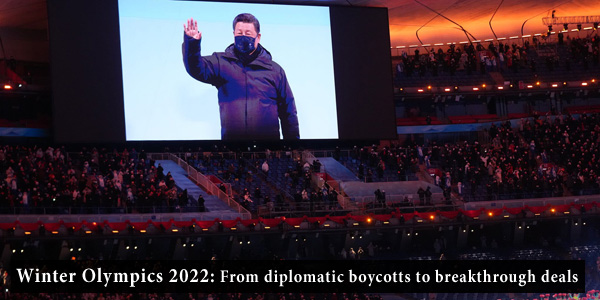
Here is what happened on the sidelines of the Beijing Winter Olympics 2022
Much anticipated Winter Olympics opening ceremony commenced on February 4, 2022, to mark the start of winter games. The grand sporting event would host around 2900 athletes from 91 countries. This is not the first time that Beijing has emerged as the place that brings together world athletes. After hosting the Beijing Olympics in 2008, the Winter Olympics of 2022 made Beijing the world’s first city to host both winter and summer Olympics games.
China has been observing one of the strictest COVID-19 precautions to maintain a zero-case policy. President Xi Jinping has not left China for more than two years. His last visit was in 2020 to visit Myanmar, only a few days before China went into lockdown amid the surging number of coronavirus cases in Wuhan.
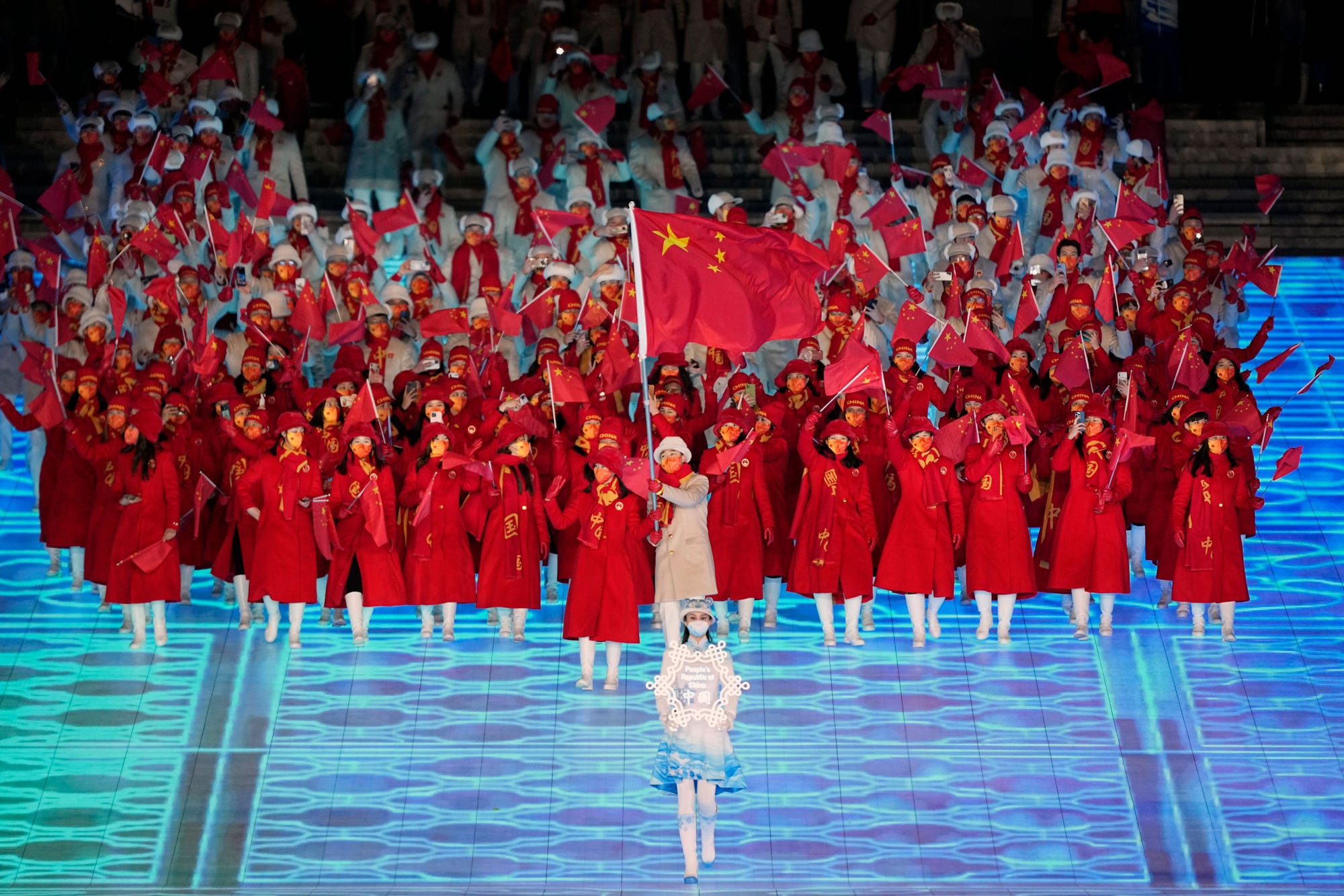 Athletes from China make their entrance at the opening ceremony of the 2022 Winter Olympics in Beijing. (Image Credit: David J. Phillip/AP)
Athletes from China make their entrance at the opening ceremony of the 2022 Winter Olympics in Beijing. (Image Credit: David J. Phillip/AP)
China’s pandemic prevention policy amid the Winter Olympics 2022
With an influx of more than 60,000 individuals including athletes, coaches, officials, delegates, and media personnel, China is observing a strict pandemic prevention policy that was evident throughout the opening ceremony as well as all the sporting events so far. The games would take place only in the presence of a small number of the selected audience while no international fans are allowed to attend the events.
All the participants of Winter Olympics 2022 have to follow strict protocols in order to avoid the spread of the virus. COVID-19 tests are being conducted frequently among athletes, officials, and other related personnel. Since January 23, China has conducted more than 610,000 tests related to the Winter Olympics out of which only 287 tests came positive so far.
Despite following a harsh pandemic prevention policy, China sent several invitations to international leaders and delegates from around the world to participate in the vibrant opening ceremony. President Xi Jinping and Prime Minister Li Keqiang held several high-level face-to-face meetings with distinguished guests and international leaders on the sidelines of the Beijing Olympics opening ceremony. As China’s strong regional allies like Russia and Pakistan warmly attended the opening ceremony, some Western countries boycotted the games for their own different reasons.
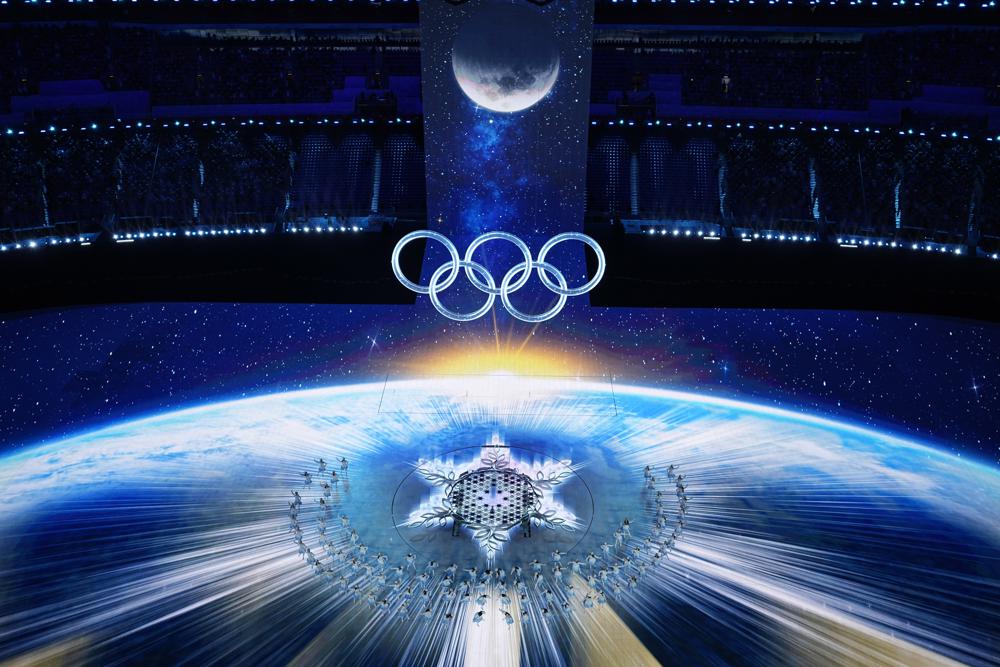 Dancers perform during the opening ceremony of the 2022 Winter Olympics, Friday, February 4, 2022, in Beijing. (Image Credit: Jeff Roberson/AP)
Dancers perform during the opening ceremony of the 2022 Winter Olympics, Friday, February 4, 2022, in Beijing. (Image Credit: Jeff Roberson/AP)
Here are some highlights of who attended the opening and who opted to stay away, and why:
Russia
Russian President Vladimir Putin arrived in Beijing on February 4 to attend the inaugural ceremony of the games. Putin met the Chinese President Xi Jinping hours before the ceremony. This was the first face-to-face meeting for President Xi with a world leader in nearly two years. The meeting was significant amid Moscow’s deteriorating relations with the West over the Ukraine conflict. The joint statement by the two leaders reaffirmed the ties to support each other’s foreign policy including the Ukraine conflict and Taiwan issue. The two leaders also showed concerns over America’s increasing interference in the Indo-Pacific region as well as the AUKUS defense alliance between the U.S., UK, and Australia.
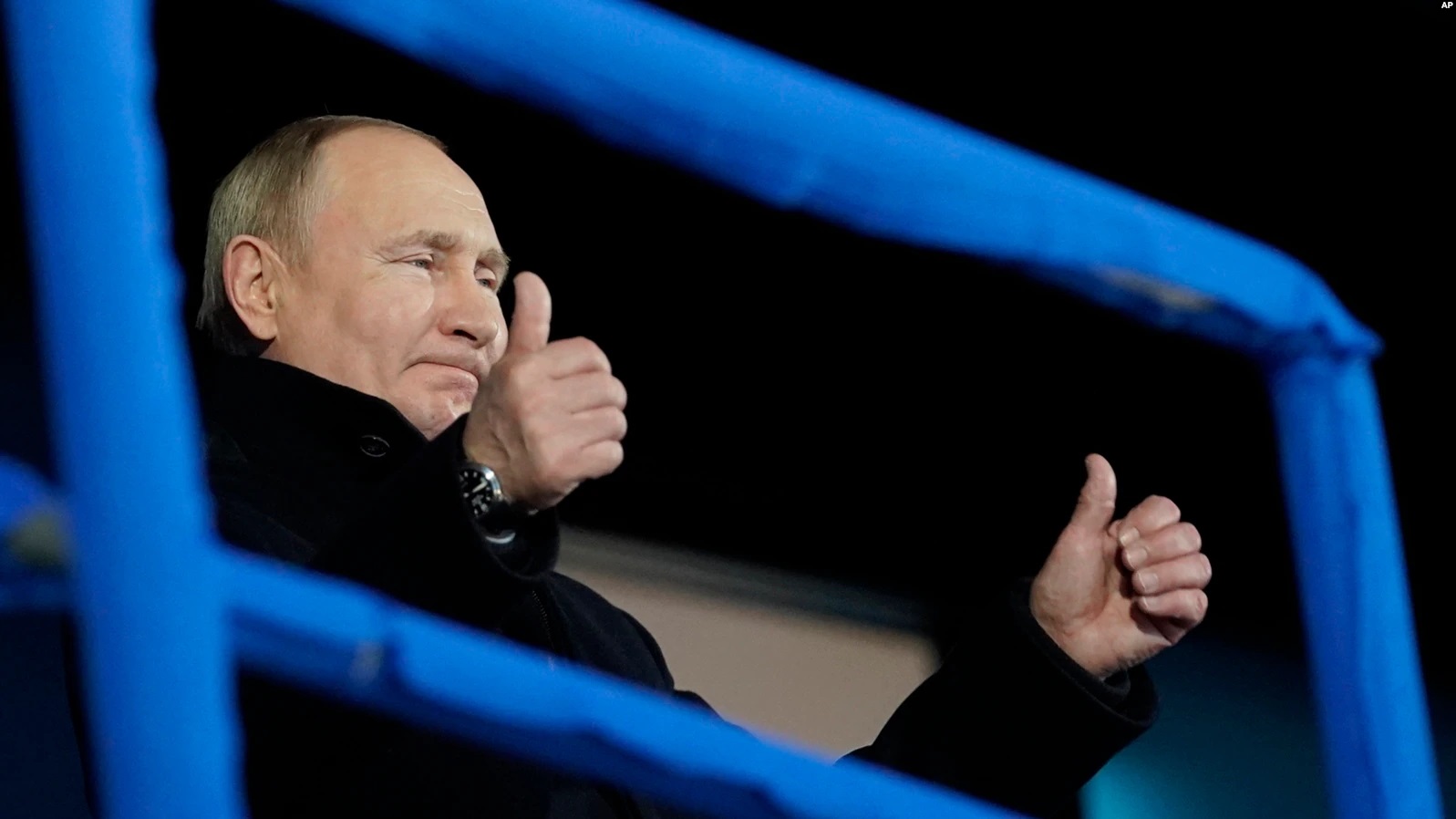 Russian President Vladimir Putin attends the opening ceremony of the 2022 Winter Olympics in Beijing on February 4. (Image Credit: AP)
Russian President Vladimir Putin attends the opening ceremony of the 2022 Winter Olympics in Beijing on February 4. (Image Credit: AP)
China and Russia confirmed as many as 16 agreements during Putin’s visit to China.
Two key agreements include:
1) Gas export to China via a new pipelines system that would deliver 10 billion cubic meters of gas annually, and
2) Cooperation deal between Russian state corporation Roscosmos and the Chinese Satellite Navigation System Commission to ensure complementarity of the GLONASS and Beidou global satellite navigation systems to solidify China-Russia partnership and rival U.S.-owned GPS.
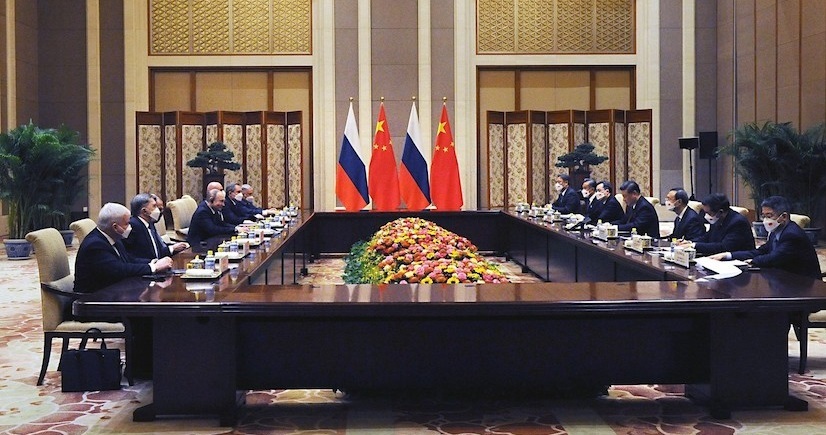 Chinese President Xi Jinping holds talks with Russian President Vladimir Putin at the Diaoyutai State Guesthouse in Beijing, China, on February 4, 2022. (Image Credit: Kremlin)
Chinese President Xi Jinping holds talks with Russian President Vladimir Putin at the Diaoyutai State Guesthouse in Beijing, China, on February 4, 2022. (Image Credit: Kremlin)
Mongolia
On the afternoon of February 6, Mongolian Prime Minister Luvsannamsrai Oyun-Erdene met with Chinese President Xi Jinping. The Mongolian Prime Minister also attended the opening ceremony of the Winter Olympics 2022. The Prime Minister conveyed regards to President Xi on behalf of the President of Mongolia Ukhnaa Khurelsukh. During the meeting, President Xi expressed that the historic relationship between China and its neighbor Mongolia is on course to reach new heights because of the ongoing BRI development projects in the two countries.
Kazakhstan, Kyrgyzstan, Tajikistan, Turkmenistan, and Uzbekistan
Top leaders from all five former Soviet Union and Central Asian countries were present during the opening ceremony. China’s President Xi Jinping had a separate one-on-one with President of Kazakhstan Kassym-Jomart Tokayev, Tajik President Emomali Rahmon, Turkmen President Gurbanguly Berdymukhamedov, and Uzbek President Shavkat Mirziyoyev and Kyrgyzstan’s President Sadyr Japarov.
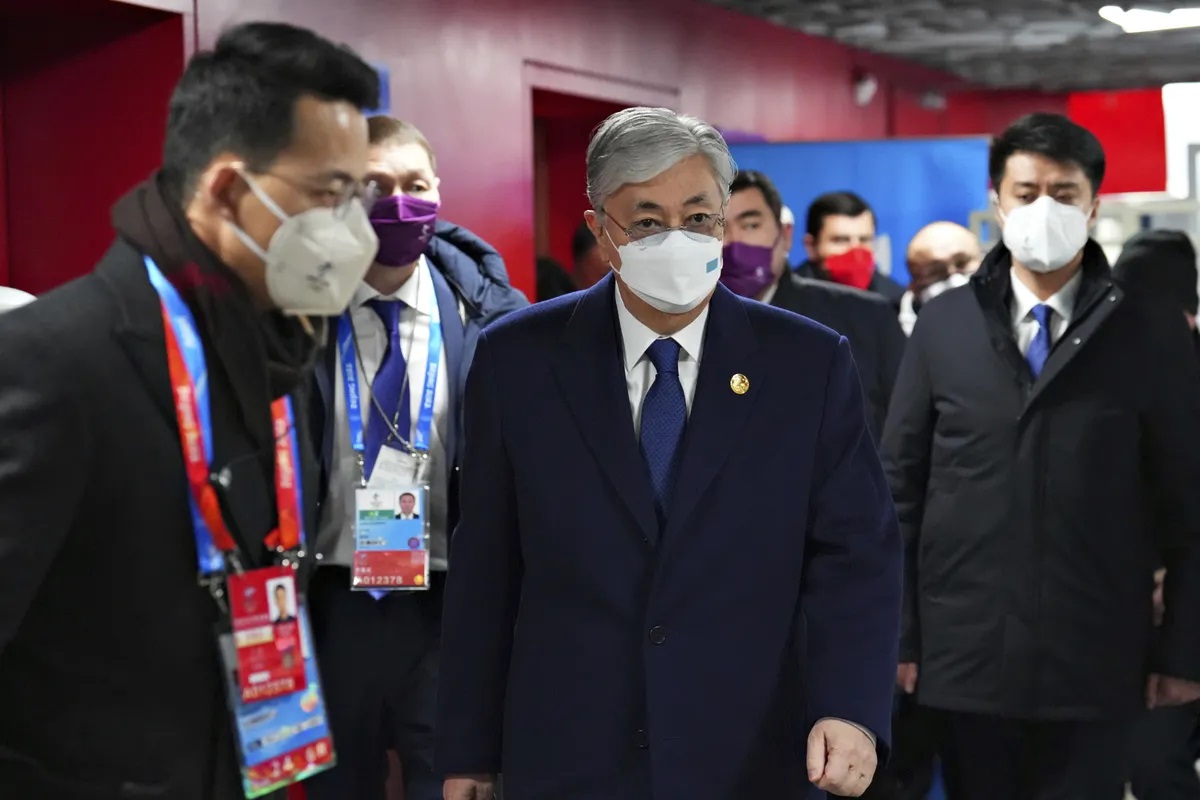 Kazakhstan President Kassym-Jomart Tokayev arrives for the opening ceremony of the 2022 Winter Olympics, Friday, Feb. 4, 2022, in Beijing. (Image Credit: Carl Court/AP)
Kazakhstan President Kassym-Jomart Tokayev arrives for the opening ceremony of the 2022 Winter Olympics, Friday, Feb. 4, 2022, in Beijing. (Image Credit: Carl Court/AP)
During his meeting with the Kazakhstan president, the Chinese president reassured his unwavering support to safeguard the independence and stability of Kazakhstan. President Xi acknowledged the importance of all the Central Asian countries for the success of China’s Belt and Road Initiative.
Singapore
President of Singapore Halima Yacob arrived in Beijing on February 4 to attend the opening ceremony along with her delegation. Her trip also included her meeting with the Chinese Prime Minister Li Keqiang and President Xi Jinping. During the meeting, the two leaders welcomed the signing of an MOU that would provide a framework for bilateral cooperation between the two countries. Singapore and China also planned to cooperate for the establishment of Collaborative Conservation and Research Institutes for Giant Panda in Singapore.
Pakistan
Pakistani Prime Minister Imran Khan attended the opening ceremony of Winter Olympics 2022 along with Pakistani Foreign Minister Shah Mehmood Qureshi. The Pakistani delegation spent four busy days in Beijing where Imran Khan met with Chinese Premier Li Keqiang and President of China Xi Jinping to bolster bilateral ties. PM Khan also met President of Uzbekistan Shavkat Mirziyoyev on the sidelines of the games. Pakistani Foreign Minister Shah Mehmood Qureshi also met his Chinese counterpart, Wang Yi.
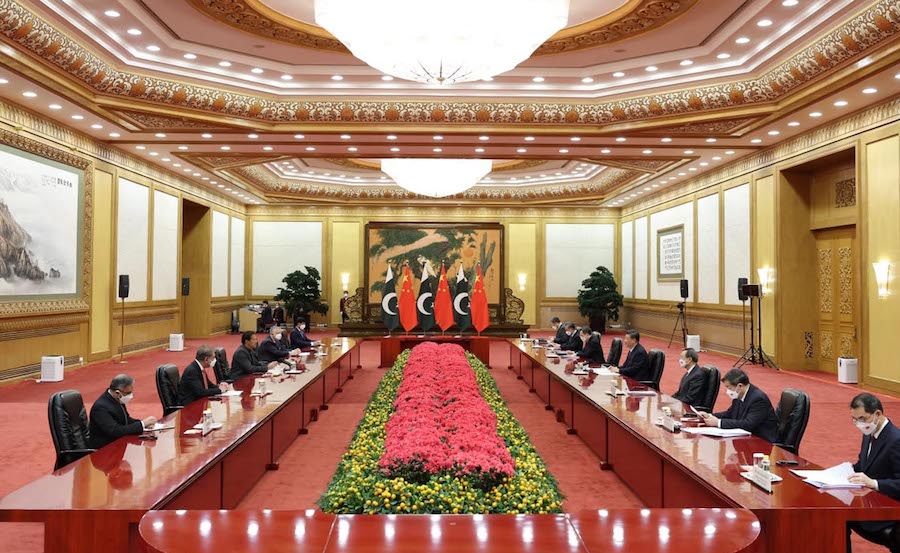 Pakistan Prime Minister Imran Khan in a delegation-level meeting with Chinese President Xi Jinping in Beijing on February 6, 2022. (Image Credit: Pakistan Prime Minister Office)
Pakistan Prime Minister Imran Khan in a delegation-level meeting with Chinese President Xi Jinping in Beijing on February 6, 2022. (Image Credit: Pakistan Prime Minister Office)
Prime Minister Imran Khan and President Xi Jinping covered extensive ground during the meeting that focused on strengthening strategic partnership, improving economic ties, reaffirming support to each other on their core issues such as Kashmir and Taiwan. President Xi also reaffirmed his support for Pakistan to diminish India’s control over the Kashmir region. They also discussed the evolving security situation in the region, especially in Afghanistan. The two leaders reasserted support to the development of the China-Pakistan Economic Corridor (CPEC), the flagship project under China’s Belt and Road Initiative (BRI), connecting China’s Xinjiang with Pakistan’s port city of Gwadar via roads, rail, and energy pipelines.
Qatar
Although Qatar is not participating in any of the sporting events in the Winter Olympics 2022, Qatari Emir Sheikh Tamim bin Hamad Al Thani attended the opening ceremony in Beijing. China is one of the most significant customers of Qatar’s natural gas. Qatari Emir also met with President Xi Jinping the day after the opening event. The two leaders agreed to work together to reach a free trade agreement between China and Gulf Cooperation Council (GCC). They also reaffirmed to strengthen the China-Middle Eastern relationship. President Xi expressed his interest in launching the first program for Panda conservation and cooperation with Qatar.
UAE
The Crown Prince of Abu Dhabi and Deputy Supreme Commander of the UAE Armed Forces Sheikh Mohammad Bin Zayed was also among the world leaders invited to attend the Winter Olympics opening ceremony. He met President Xi Jinping on February 6. The two leaders expressed interests in strengthening economic and political ties between China and UAE, particularly in the fields of investments and economic cooperation.
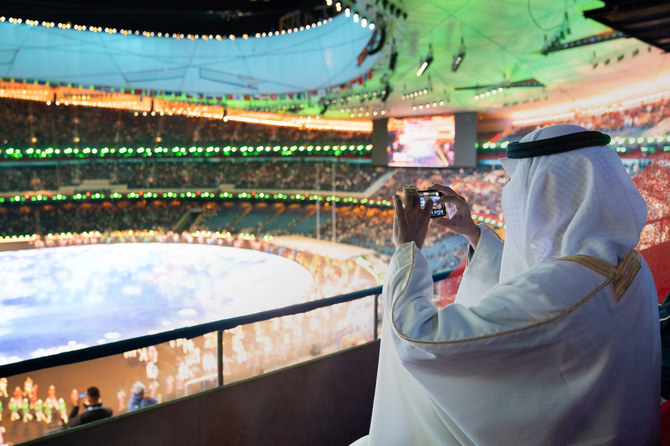 Abu Dhabi Crown Prince Sheikh Mohammed bin Zayed and his delegation attend the opening ceremony of Beijing 2022 Olympic Winter Games. (Image Credit: WAM)
Abu Dhabi Crown Prince Sheikh Mohammed bin Zayed and his delegation attend the opening ceremony of Beijing 2022 Olympic Winter Games. (Image Credit: WAM)
Saudi Arabia
Saudi Arabia marked its first-ever participation in the Winter Olympics games since the games began in 1924. The country also became the only GCC member country to participate in the Beijing Winter Olympics of 2022. To mark this momentous moment, Saudi Crown Prince Mohammed Bin Salman was slated to attend the opening ceremony but eventually, it was Minister of Sports and President of Saudi Olympic Committee Prince Abdulaziz bin Turki Al Faisal who headed the Saudi delegation to Beijing, attended the ceremony. Saudi Arabia’s ambassador to the U.S. Princess Reema bint Bandar was also among the officials who joined.
Egypt
After attending the opening ceremony, President Xi Jinping met Egyptian President Abdel Fattah al-Sisi. The two countries have become closer, especially after Egypt was included to be a part of the BRI through advanced cooperation between the two sides under Suez Canal Corridor Development Project. President Xi acknowledged Egypt’s importance to reaffirm China-Arab and China-Africa cooperation programs.
Serbia
The Serbian President Aleksandar Vucic arrived in Beijing on February 4 to attend the Winter Olympics opening ceremony and met with his Chinese counterpart on February 5. During the meeting, President Xi Jinping referred to the China-Serbia partnership as “Iron-clad” friendship, a term that Chinese officials use to define a close international relationship. President Xi Jinping also stated that China sees Serbia as one of its closest partners and a major role player in developing China’s cooperative relationship with the Balkan states.
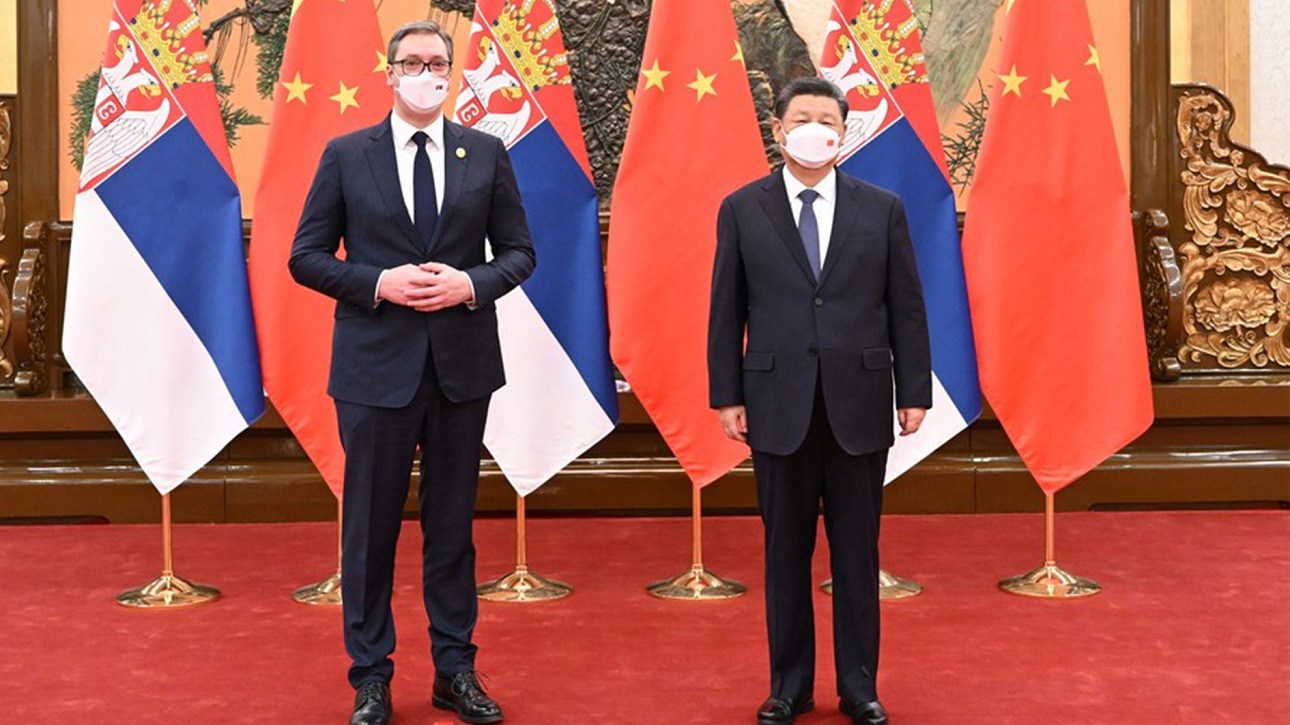 Serbia’s President Aleksandar Vucic with Chinese President Xi Jinping, at the Great Hall of the People in Beijing, China, February 5, 2022. (Image Credit: CGTN)
Serbia’s President Aleksandar Vucic with Chinese President Xi Jinping, at the Great Hall of the People in Beijing, China, February 5, 2022. (Image Credit: CGTN)
Monaco
Monaco’s Prince Albert II arrived in Beijing on February 6 to attend the opening ceremony of the Winter Olympics 2022. Being a winter sports athlete himself and a former Winter Olympics competitor, Prince Albert II holds a close association with the winter games. He is a member of the International Olympic Committee and the president of Monaco’s Olympic Committee. After attending the opening ceremony, he met with President Xi Jinping where the two leaders discussed the new plans for China-Monaco economic cooperation. Prince Albert II praised China’s efforts to establish 5G network in Monaco.
Poland
President of Poland Andrzej Duda arrived in Beijing to attend the opening ceremony for the Winter Olympics 2022. The attendance of the Polish president is a significant indication of Poland’s inclination towards China and its worsening relations with the U.S. amid President Joe Biden’s term in the office. Poland’s relationship with China has seen a positive trajectory in recent times. President Andrzej Duda also made a surprise appearance during China’s 17+1 summit with the Eastern European countries, where all other Eastern European countries sent lower-ranked officials.
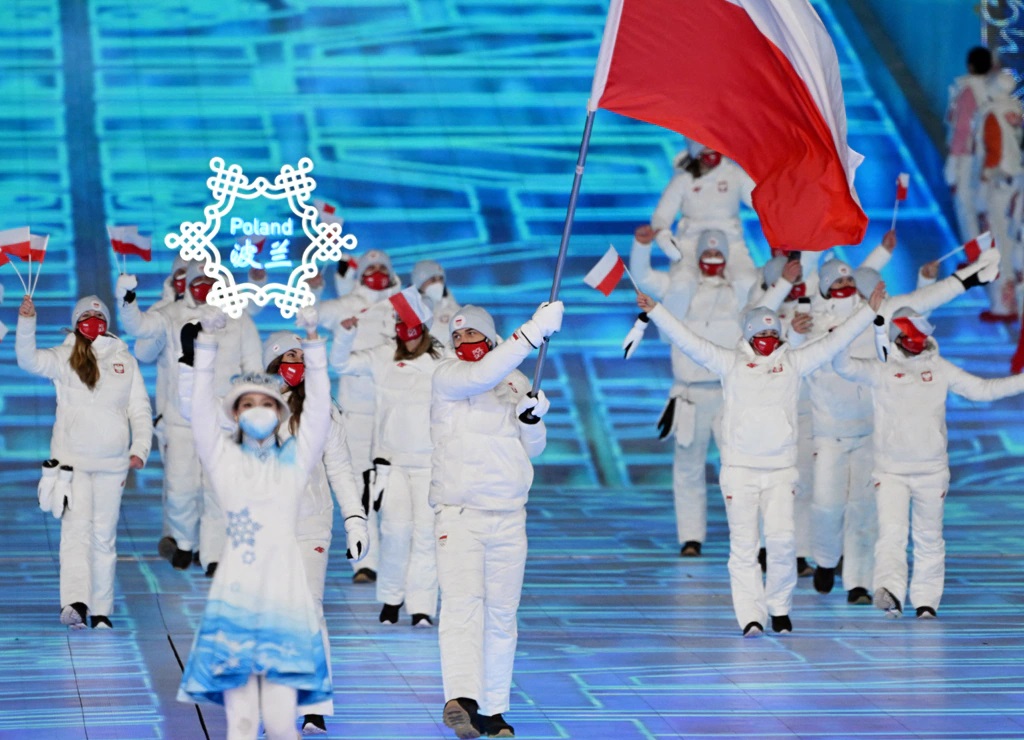 Team Poland during the Parade of Nations at the opening ceremony of the 2022 Winter Olympics in Beijing. (Image Credit: Manan Vatsyayana/AFP)
Team Poland during the Parade of Nations at the opening ceremony of the 2022 Winter Olympics in Beijing. (Image Credit: Manan Vatsyayana/AFP)
Poland’s President Duda met with President Xi Jinping on February 6. During the meeting, President Xi acknowledged Poland’s efforts for establishing China-EU industrial supply chains. President Duda emphasized that Poland is one of the most active participants of the Central and Eastern European Countries (CEEC) cooperation, and emphasized that Poland will continue to play a positive role in promoting CEEC-China cooperation and EU-China relations.
Argentina and Ecuador
Argentina officially joined China's trillion-dollar BRI in a signing ceremony held on the sidelines of the Winter Olympics, indicating a major win for Beijing in Latin America. The two countries also signed MoUs in areas including aerospace, the BeiDou Navigation Satellite System, green development, digital economy, and agriculture. Chinese President Xi Jinping also held a one-on-one meeting with Argentine President Alberto Fernandez.
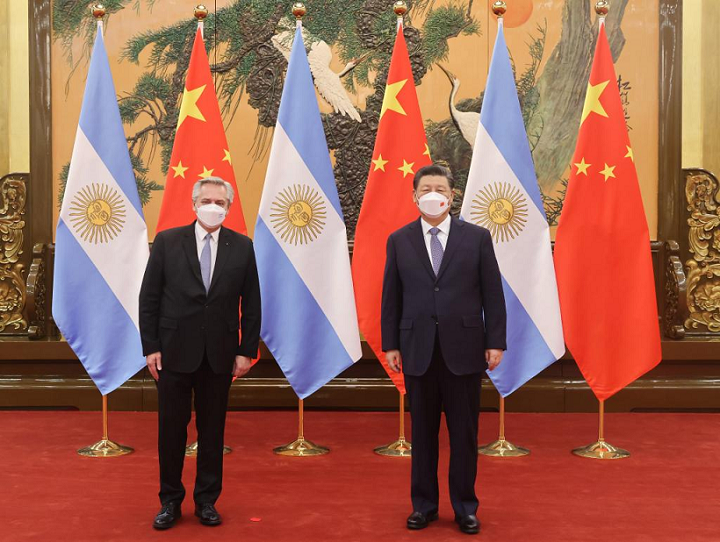 Chinese President Xi Jinping meets with Argentine President Alberto Fernandez, who came to China for the opening ceremony of the Beijing 2022 Olympic Winter Games, at the Great Hall of the People in Beijing, China, February 6, 2022. (Image Credit: Xinhua/Liu Weibing)
Chinese President Xi Jinping meets with Argentine President Alberto Fernandez, who came to China for the opening ceremony of the Beijing 2022 Olympic Winter Games, at the Great Hall of the People in Beijing, China, February 6, 2022. (Image Credit: Xinhua/Liu Weibing)
Ecuador is also set to become one of China’s biggest allies in Latin America after joining the BRI project. Ecuador’s President intends to improve trade links with China. Despite having major pressures from Western countries to boycott the Winter Olympics 2022, leaders from Argentina and Ecuador attended the opening ceremony and met President Xi in one-on-one meetings.
Countries boycotting the Beijing Winter Olympics 2022
Much of the Western world decided not to contribute to the fanfare in China and announced a diplomatic boycott for several different reasons but mainly over human rights concerns. Despite the boycott by officials, the athletes of all Western countries are still competing.
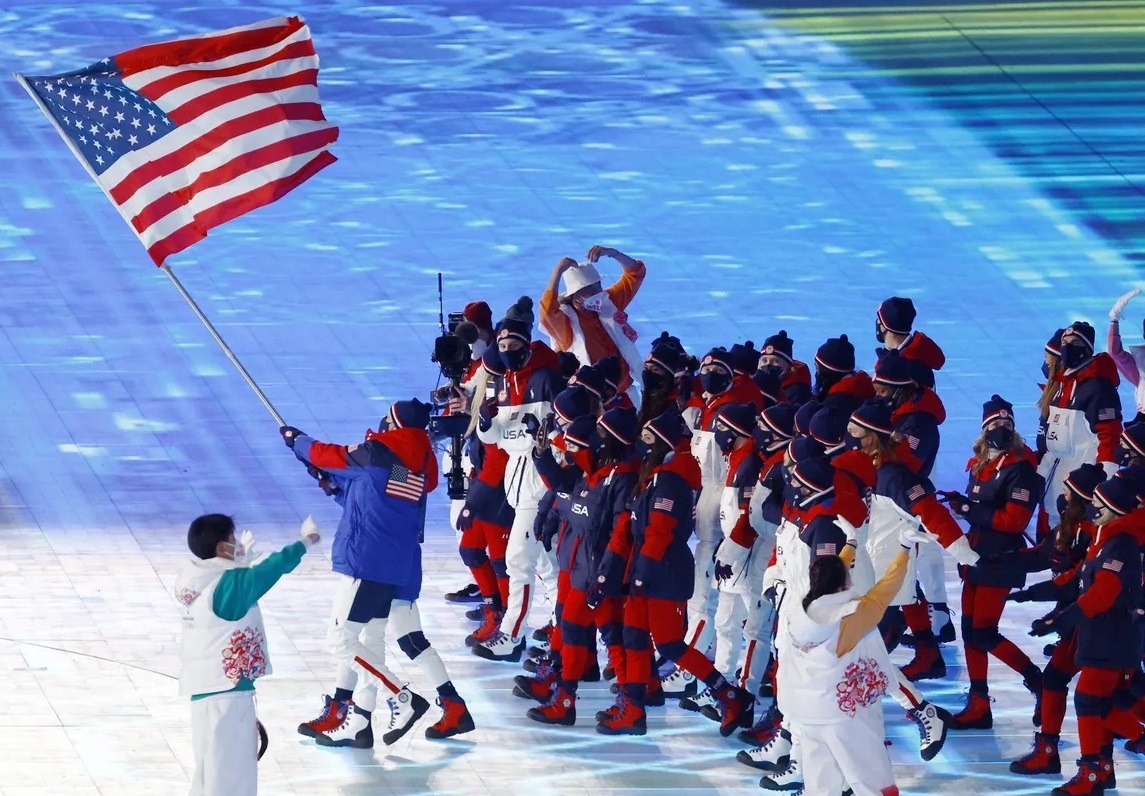 Flag bearers Elana Meyers Taylor of the United States and John Shuster of the United States lead their delegation during the athletes parade at the opening ceremony. (Image Credit: Evgenia Novozhenina/Reuters)
Flag bearers Elana Meyers Taylor of the United States and John Shuster of the United States lead their delegation during the athletes parade at the opening ceremony. (Image Credit: Evgenia Novozhenina/Reuters)
U.S., United Kingdom, Canada, and Australia
The U.S. announced its diplomatic boycott in December 2021 on the grounds of China’s “Genocide and Crimes Against Humanity”. The United Kingdom, Canada, and Australia followed the decision shortly after. No officials or political leaders from these countries participated in the opening ceremony; however, the athletes from all four countries are competing in the games.
India
India announced a last-minute diplomatic boycott of the Winter Olympics in Beijing. India decided not to send any official to the games after it was reported that the Chinese military commander involved in the 2020 border clashes has been chosen as one of the torchbearers in Beijing. People's Liberation Army (PLA) commander Qi Fabao is hailed as a hero in China for his role in fighting in the 2020 India-China skirmish that killed at least 20 Indian soldiers.
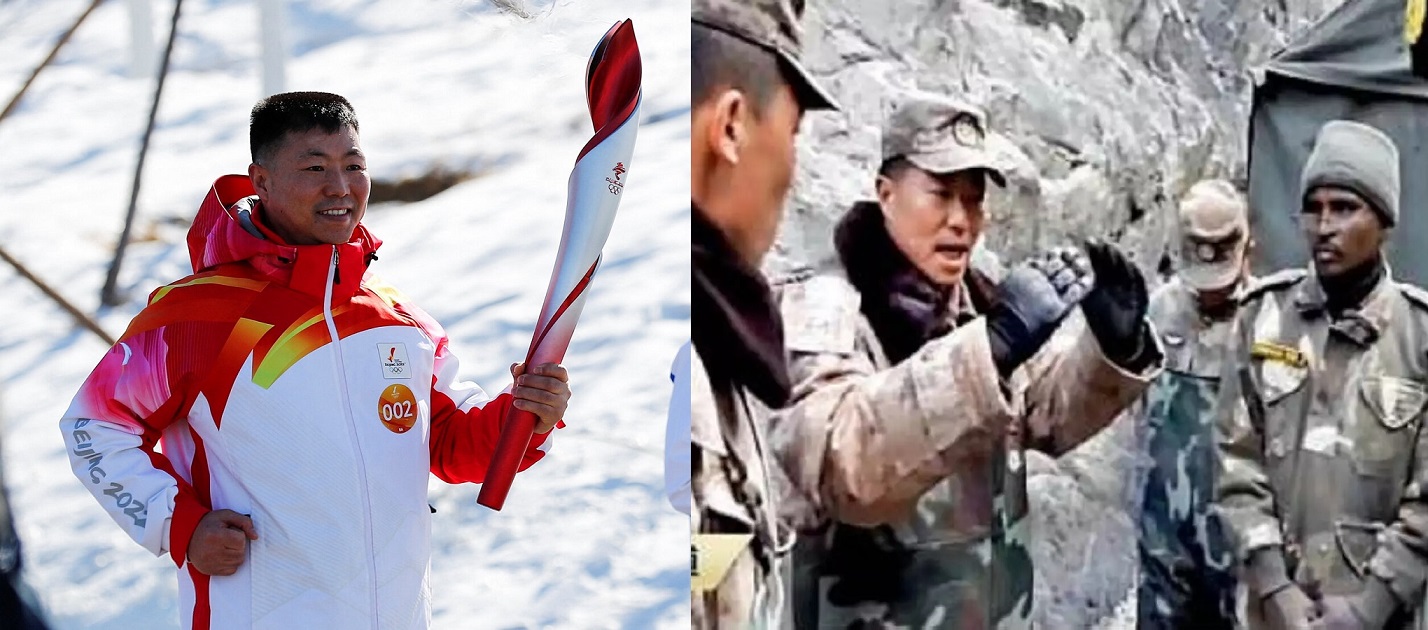 People's Liberation Army commander Qi Fabao in a photograph on left as a torchbearer. (Image Credit: China News Service via Reuters)
People's Liberation Army commander Qi Fabao in a photograph on left as a torchbearer. (Image Credit: China News Service via Reuters)
In a photo on right, Qi Fabao (2nd from left) is seen talking to members of Indian forces as troops faced off in the Galwan Valley on June 15, 2020. (Image Credit: China’s CCTV via AP Video)
Kosovo and Lithuania
Lithuania and Kosovo’s deteriorating relations with China have been making headlines for several weeks. Lithuania and Kosovo’s support for Taiwan’s independence sparked friction with China that translated into a diplomatic boycott from the two counties of Beijing Winter Olympics 2022.
Neutral Participants
Despite not officially declaring a diplomatic boycott against the Winter Olympics 2022, some Western countries, including includes Germany, Sweden, Norway, Austria, and Switzerland, did not send any official or political leader to attend the opening ceremony. All these countries are big winter sports destinations, but the leaders or royals from these European countries did not participate in the opening ceremony this time.
While other countries such as Denmark, the Netherlands, and New Zealand cited COVID-19 precautions along with concerns over China’s human rights situation as their reason to decline their attendance for the opening ceremony.
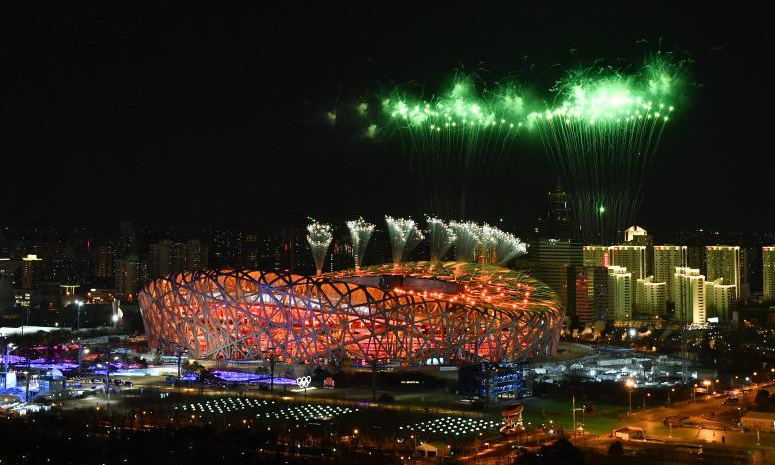 Fireworks illuminate the night sky during the opening ceremony of the Beijing 2022 Olympic Winter Games at the National Stadium in Beijing, capital of China, Feb. 4, 2022. (Image Credit: Xinhua/Li Xin)
Fireworks illuminate the night sky during the opening ceremony of the Beijing 2022 Olympic Winter Games at the National Stadium in Beijing, capital of China, Feb. 4, 2022. (Image Credit: Xinhua/Li Xin)
ALSO READ:
Regions
Issues

















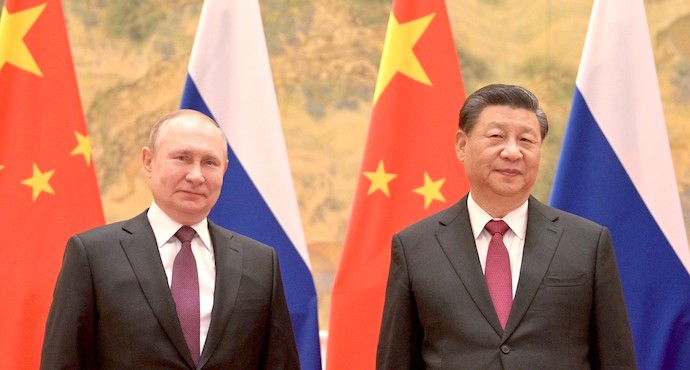 Russia, China strengthen strategic partnership, oppose NATO expansion
Russia, China strengthen strategic partnership, oppose NATO expansion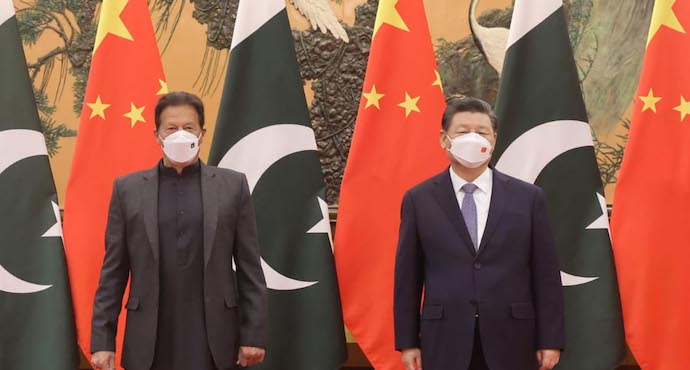 China and Pakistan to bolster strategic partnership as Xi meets Khan
China and Pakistan to bolster strategic partnership as Xi meets Khan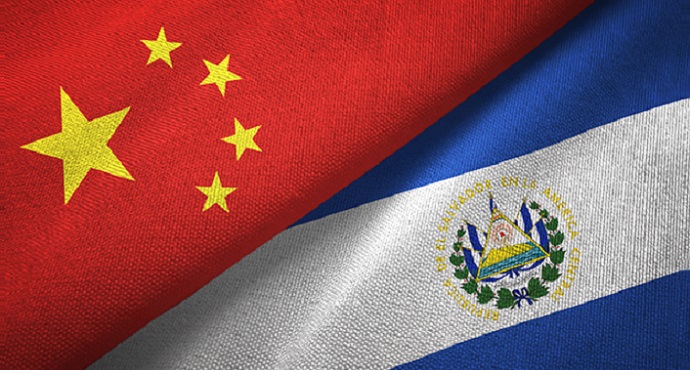 China deepens ties with El Salvador: Should US be worried about another Cuban missile crisis episode?
China deepens ties with El Salvador: Should US be worried about another Cuban missile crisis episode?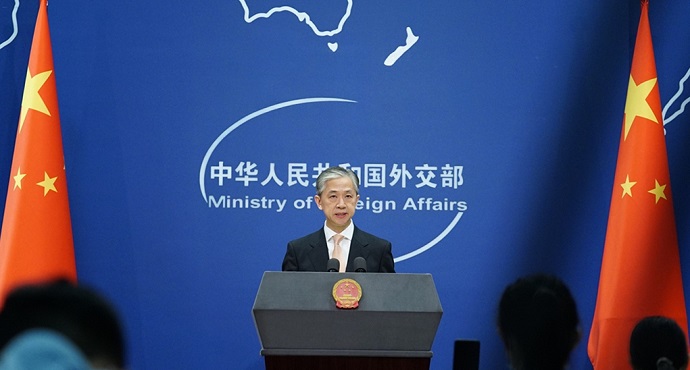 China bashes United States or its response to the COVID-19 pandemic prevention measures
China bashes United States or its response to the COVID-19 pandemic prevention measures







